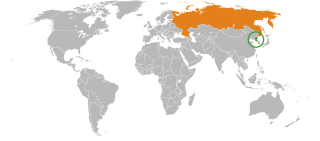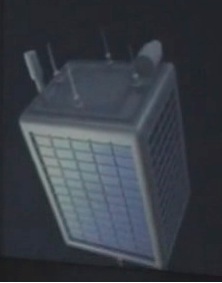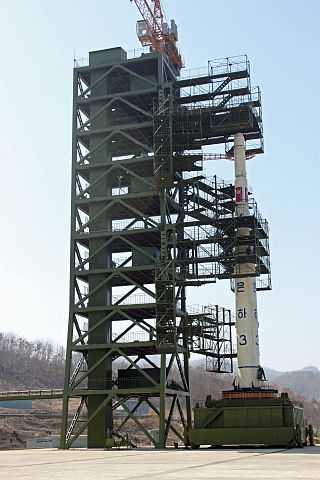
The Treaty on the Non-Proliferation of Nuclear Weapons, commonly known as the Non-Proliferation Treaty or NPT, is an international treaty whose objective is to prevent the spread of nuclear weapons and weapons technology, to promote cooperation in the peaceful uses of nuclear energy, and to further the goal of achieving nuclear disarmament and general and complete disarmament. Between 1965 and 1968, the treaty was negotiated by the Eighteen Nation Committee on Disarmament, a United Nations-sponsored organization based in Geneva, Switzerland.

Nuclear proliferation is the spread of nuclear weapons, fissionable material, and weapons-applicable nuclear technology and information to nations not recognized as "Nuclear Weapon States" by the Treaty on the Non-Proliferation of Nuclear Weapons, commonly known as the Non-Proliferation Treaty or NPT. Proliferation has been opposed by many nations with and without nuclear weapons, as governments fear that more countries with nuclear weapons will increase the possibility of nuclear warfare, de-stabilize international or regional relations, or infringe upon the national sovereignty of nation states.
The six-party talks aimed to find a peaceful resolution to the security concerns as a result of the North Korean nuclear weapons program. There was a series of meetings with six participating states in Beijing:

United Nations Security Council resolution 825, adopted on 11 May 1993, called upon the Democratic People's Republic of Korea to reconsider its decision to withdraw from the Treaty on the Non-Proliferation of Nuclear Weapons and allow weapons inspectors from the International Atomic Energy Agency (IAEA) into the country, after it had previously refused entry.

United Nations Security Council Resolution 1695, adopted unanimously on July 15, 2006, after recalling resolutions 825 (1993) and 1540 (2004) concerning North Korea and the non-proliferation of weapons of mass destruction respectively, the Council banned the selling of material that would further the ability of the Democratic People's Republic of Korea to bolster its ballistic missiles programme.

United Nations Security Council Resolution 1718 was adopted unanimously by the United Nations Security Council on October 14, 2006. The resolution, passed under Chapter VII, Article 41, of the UN Charter, imposes a series of economic and commercial sanctions on the Democratic People's Republic of Korea in the aftermath of that nation's claimed nuclear test of October 9, 2006.

United Nations Security Council Resolution 1747 was a United Nations Security Council resolution, written with reference to some IAEA reports, that tightened the sanctions imposed on Iran in connection with the Iranian nuclear program. It was adopted unanimously by the United Nations Security Council on 24 March 2007.

North Korea–Russia relations are the bilateral relations between Russia and North Korea. The Soviet Union was the first to recognize North Korea on October 12, 1948, shortly after the proclamation, as the sole legitimate authority in all of Korea. During the Korean War, the Korean People's Army was supported by the Soviet Armed Forces. North Korea was founded as part of the Communist bloc, and received major Soviet military and political support. The comprehensive personality cult around North Korea's ruling family was heavily influenced by Stalinism. China and the Soviet Union competed for influence in North Korea during the Sino-Soviet split in the 1960s, as North Korea tried to maintain good relations with both countries.

Kwangmyŏngsŏng-2 was a satellite launched by North Korea on April 5, 2009.

United Nations Security Council Resolution 1874 was adopted unanimously by the United Nations Security Council on 12 June 2009. The resolution, passed under Chapter VII, Article 41, of the UN Charter, imposes further economic and commercial sanctions on the Democratic People's Republic of Korea and encourages UN member states to search North Korean cargo, in the aftermath of an underground nuclear test conducted on 25 May 2009.

Kwangmyŏngsŏng-3 was a North Korean Earth observation satellite which, according to the DPRK, was for weather forecast purposes, and whose launch was widely portrayed in the West to be a veiled ballistic missile test. The satellite was launched on 13 April 2012 at 07:39 KST aboard the Unha-3 carrier rocket from Sohae Satellite Launching Station. The rocket exploded 90 seconds after launch near the end of the firing of the first stage of the rocket. The launch was planned to mark the centenary of the birth of Kim Il-sung, the founder of the republic. On 1 December 2012 North Korea announced that a replacement satellite would be launched between 10 and 22 December 2012. After a delay and extending the launch window to 29 December, the rocket was launched on 12 December.
The Foreign Trade Bank of the Democratic People's Republic of Korea is North Korea's primary foreign exchange bank, and is owned and run by the North Korean government.

The United Nations Security Council unanimously adopted Resolution 2270 on March 2, 2016, with approval of all the five permanent members and the ten non-permanent members in response to North Korea’s fourth nuclear test on January 6, 2016, and its launch of a long-range missile carrying what it said was a satellite on February 7, 2016.
A number of countries and international bodies have imposed sanctions against North Korea. Currently, many sanctions are concerned with North Korea's nuclear weapons program and were imposed after its first nuclear test in 2006.

The UN Security Council Sanctions Committee on North Korea is a subsidiary body established in 2006 by the UN Security Council's resolution 1718 in response to North Korea's first nuclear test and its other nuclear proliferation efforts.

The United Nations Security Council unanimously adopted Resolution 2371 on August 5, 2017, with approval of all the five permanent members and the ten non-permanent members in response to North Korea’s July 2017 missile tests.

United Nations Security Council Resolution 2375 was adopted on 11 September 2017. The United Nations Security Council unanimously adopted a new sanctions resolution against North Korea, a response to its sixth nuclear test on September 3. The resolution reduces about 30% of oil provided to North Korea by cutting off over 55% of refined petroleum products going to North Korea.

European Union–North Korea relations are the foreign relations between the European Union and the country of North Korea. Bilateral relations between North Korea and the EU date back to the 1990s.














